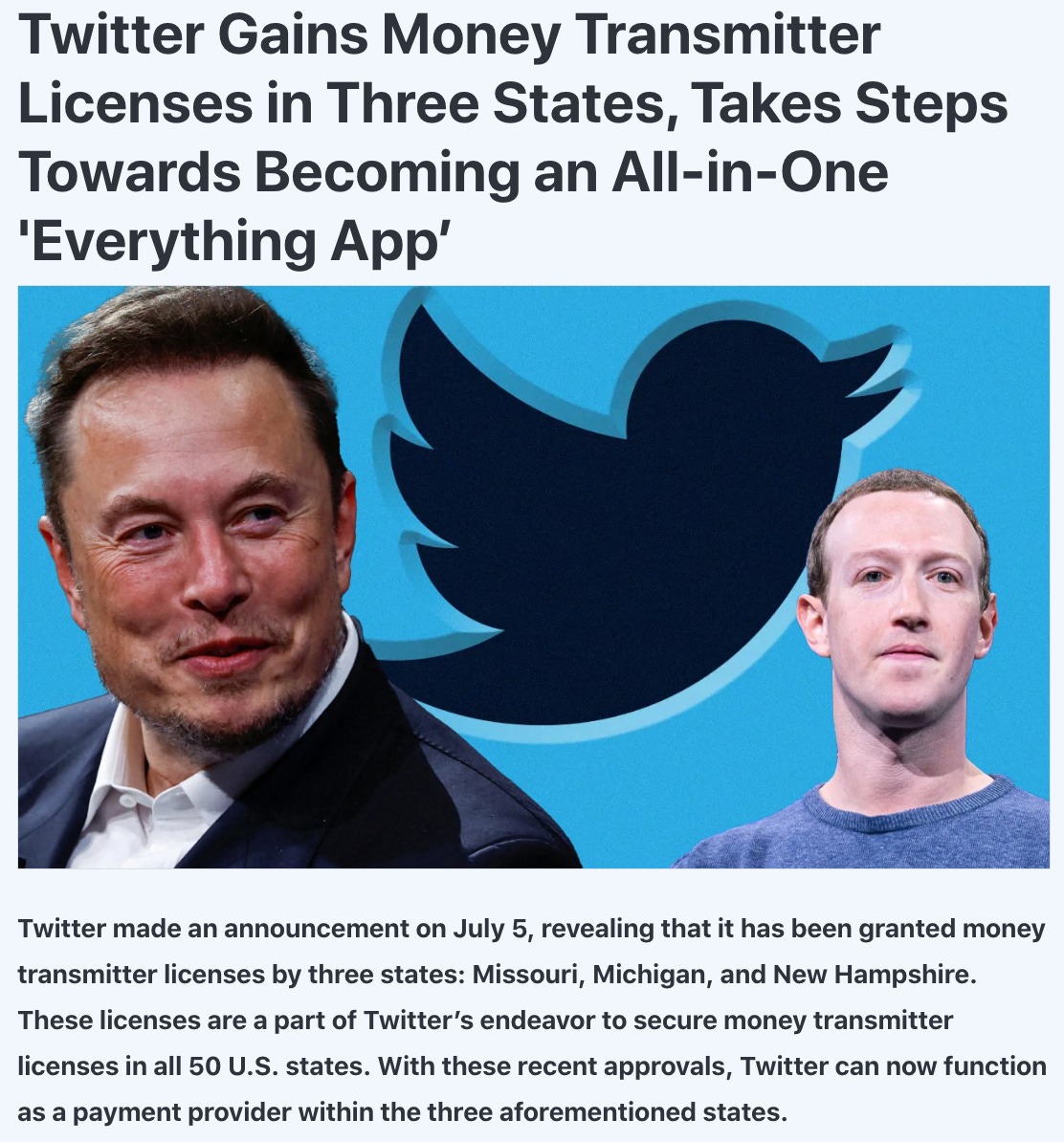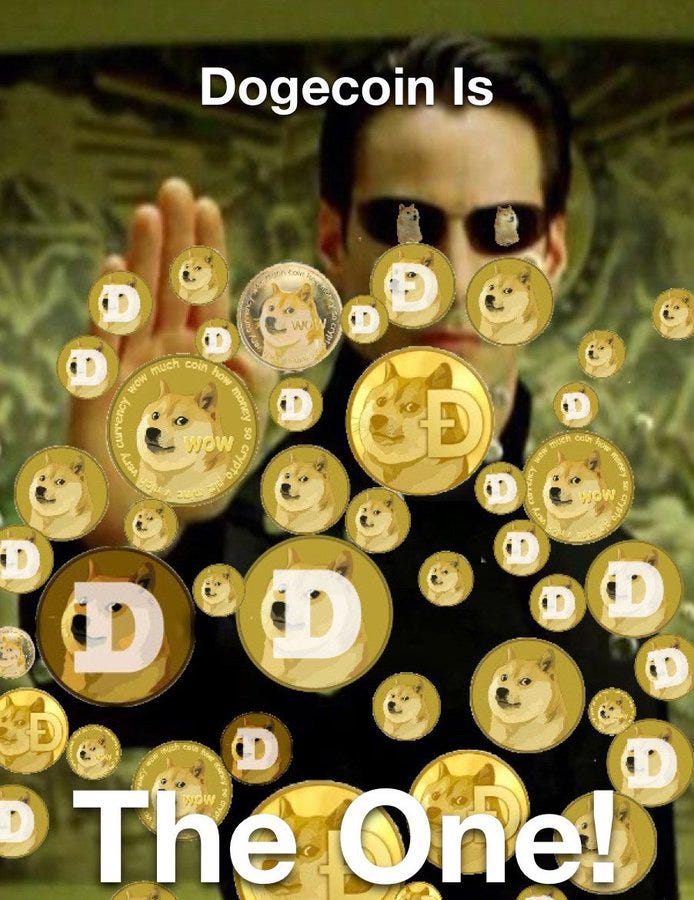Is Dogecoin Dangerous to Bitcoin?
Why do Bitcoiners fear the Doge?
Hey everyone,
Jack Dorsey is one of the most respected voices in technology.
The founder of Twitter has done more to advance the adoption of Bitcoin than just about anyone else on the planet. His vision is admirable: by fixing the technology that is money, he hopes to create world peace.
Recently, he was asked about Doge. Let’s break down his answer.
Last week, Twitter founder Jack Dorsey appeared on a new Bitcoin podcast, where he talked about Doge.
Both Dorsey and his interviewer, Jack Mallers, are hardcore Bitcoiners. Mallers expressed dismay at Elon’s support of Dogecoin and asked for Dorsey’s opinion.
Dorsey began by offering kind words for Doge:
Elon is obviously working on problems he believes are beneficial to humanity like cars and sending people to Mars, and now Twitter. And I think Doge in that sense, just to give him the benefit of the doubt, represents fun and diversion. People need stress relief and jokes and I think that’s more or less what it represents.
However, he went to describe Doge as “dangerous” because it distracts from serious projects like Bitcoin.
That said, I do think the distraction is dangerous, I think people lose money because of what he says and his excitement, they buy into something like Dogecoin, the next day it falls. I don’t believe it has any real fundamentals. It was literally started as a joke. If you’re not treating it as that, and as a diversion, there’s issues there.
Doge is dangerous to Bitcoin, but not for the reasons Jack says. Here’s why.
Under Dorsey’s watch, Twitter was Bitcoin country.
With his support, Bitcoin Twitter became one of the most influential communities on social media.
It helped that he used his companies to promote Bitcoin in various ways, including making a Twitter-specific Bitcoin emoji, building Bitcoin tipping into Twitter, integrating Bitcoin into Cash App, and having Square hold $220M worth of Bitcoin in its Treasury.

Since 2021, Doge has crashed the party.
The arrival of the DogeArmy marked a new era for Twitter. Elon’s support for Doge through Tesla, The Boring Company, and SpaceX drove Bitcoiners up the wall because they’d envisioned Bitcoin in that role.
The shift is best symbolized by epic moment at Bitcoin’s 2021 Miami conference, when a guy ran on stage, ripped off his shirt to reveal a picture of Doge, and shouted “Dogecoin to the moon!”
Dogecoin’s arrival as the hottest crypto on Twitter has the coincided with a surprising turn in Bitcoin’s fate.
For most of its existence, Bitcoin has been anti-establishment alternative to the banking industry
But as it grew more succesful, Bitcoin became the elite establishment.
Now, it appears on the cusp of gaining acceptance by Wall Street. Last week, BlackRock CEO Larry Fink said it is an “international asset” and compared it to “digitized gold.”
His company, the world’s largest asset manager, is applying to launch a Bitcoin ETF along with several of its peers.
Hilariously, no sooner did Wall Street embrace Bitcoin than the media changed its tune.
After a decade of smearing Bitcoin as a tool for money-laundering and environmental destruction, Forbes began praising it as an environmentally friendly hedge against inflation.
The change of tone is a reminder of how quickly narratives can change. The Wall Street news is definitely bullish for Bitcoin, but it also detracts from its anti-establishment street cred.
Dogecoin adoption is following a different trajectory. As Wall Street has brought Bitcoin into the fold, Doge has become the plucky underdog disrupting the status quo.
Serious financial institutions don’t have any plans to launch a Dogecoin ETF (though maybe they should). For Doge adoption to happen, it has to be led from the ground up by the people who use it as digital cash.
Twitter has an amazing opportunity to facilitate this process. Last week saw more good news when it was awarded money transmitter licenses in three states, the first step toward becoming a payment processor.
The ultimate goal is for Doge to become the currency of Twitter’s online content marketplace, allowing journalists, artists, and other creators to sell their work with Dogecoin micro transactions. For this to happen, regular people will have to take the Doge pill.
The thesis of this newsletter has always been that Bitcoin and Dogecoin are stronger if they can co-exist, with Bitcoin functioning as digital gold and Dogecoin as digital cash.
One reason is that Dogecoin’s memes and laid-back vibe make it a great tool for onboarding the masses to crypto.
Some folks naturally avoid Bitcoin because it is expensive, complicated, and occasionally toxic. Doge is the perfect solution to recruit these people into the digital money revolution.
This might not be the outcome most Bitcoiners imaged—they’ve always wanted Bitcoin to be both cash and gold—but it would be better for global crypto adoption, and more entertaining to boot.
Doge’s status as a meme also gives it a power Bitcoin lacks: it’s good to have a monetary asset that’s fully owned and used by regular people, and that Wall Street won’t touch.
In this light, Dogecoin is an insurance policy to prevent Wall Street from co-opting Bitcoin’s mission to “Fix the money, fix the world.”

So far, Bitcoiners have been pretty close-minded about Dogecoin. Most treat it as anathema, refusing to mention it by name.
When they do, they typically dismiss it with contempt, as if it is beneath consideration despite support from the world’s most exciting entrepreneur.
Dorsey’s comments were noteworthy because he broke the taboo. While it’s good to hear him offer kind words for Doge, he clearly doesn’t take it seriously.
The irony of Jack Dorsey’s criticism is that he is repeating the same criticisms once levied against Bitcoin, against Doge.
In 2018, when Bitcoin tumbled from 20k to 3k, the haters came out in droves to pronounce it as unserious and lacking in intrinsic value. At this point, you’d think Jack would know better.
It takes a certain open-mindedness to get into crypto at all. A decade ago, few had any inkling that digital money would change the world, and yet here we are today, watching the biggest financial firms in the US line up to stack Satoshis.
So far, this open-mindedness hasn’t extended to Dogecoin. I’m curious if Mallers or Dorsey are open to a good-faith dialogue about Doge, whether it be over Twitter, in person, or some other way.
For now, the question lingers: is Dogecoin too dangerous for Bitcoiners, or can the two communities learn to prosper together?
My guess is that, when all is said and done, we’ll find in even the frostiest Bitcoin maximalist beats a heart of Doge.
Dogey Treats: News Bites
MyDog social wallet released the 2.0 build of its app.
Cameron and Tyler Winklevoss initiated a lawsuit against Dogecoin nemesis Barry Silbert for accounting fraud on the part of Digital Currency Group. On Twitter, Cameron Winklevoss wrote Silbert “was not only the architect and mastermind of the DCG and Genesis fraud against creditors, he was directly and personally involved in perpetrating it.” Ryan Selkis chronicled the backstory in a useful thread.
Thank You!
Thanks for reading! Consider sending a tip or Subscribing on Substack or Twitter to help keep the newsletter going!
DJ2zTEdHBD3guHLfVaNBaypr6bHFG5Nwfw
Memes of the Week
It’s ALL Risky!
Thank you, kind reader, for reading and subscribing to this newsletter. I really appreciate it!
If you haven’t already, please sign up to this email newsletter for more weekly articles like this one. Also, please share it with a friend or on twitter if you enjoyed this article.
What do you think? Is Dogecoin dangerous? Let me know!
Remember, Dogecoin is risky. But then again, it’s all risky!
Follow on twitter at @itsALLrisky
Send an email to itsALLrisky@gmail.com
Send a Doge tip: DJ2zTEdHBD3guHLfVaNBaypr6bHFG5Nwfw
This article was written in collaboration with @CryptoDogDivine, give them a follow!
Don't forget to subscribe to this newsletter!
Disclaimer: This is not financial advice and I am not a financial advisor. The article above references an opinion for entertainment purposes only and it is not investment advice. Always assume that the author of the article is actively trading and that the opinions expressed may be biased towards the author’s holdings. Do your own research and consult with a licensed financial adviser before making any investment decision. Do not treat any opinion expressed in this newsletter as a specific inducement to make a particular investment. Content, news, research, tools, and securities symbols are for educational and illustrative purposes only and do not imply a recommendation or solicitation to buy or sell a particular security or cryptocurrency or to engage in any particular investment strategy. The information provided is not warranted as to completeness or accuracy and is subject to change without notice. The projections or other information regarding the likelihood of various investment outcomes are hypothetical in nature, are not guaranteed for accuracy or completeness, do not reflect actual investment results and are not guarantees of future results. All investments involve risk, losses may exceed the principal invested, and the past performance of a security, industry, sector, market, cryptocurrency, or financial product does not guarantee future results or returns. Dogecoin is a speculative and highly volatile asset susceptible to pump-and-dump schemes.
At the time of publication, Dogecoin is around $0.06 per coin.
















